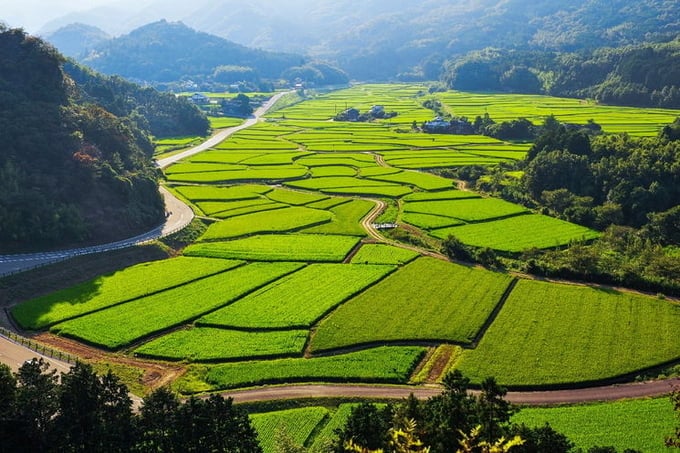November 26, 2025 | 22:21 GMT +7
November 26, 2025 | 22:21 GMT +7
Hotline: 0913.378.918
November 26, 2025 | 22:21 GMT +7
Hotline: 0913.378.918

The delegation from the Ministry of Agriculture and Rural Development of Vietnam discussing with the General Department for Rural Development under the Ministry of Agriculture, Forestry, and Fisheries of Japan on the morning of November 8. Photo: Tung Dinh.
As part of the series of events commemorating the 50th anniversary of Vietnam - Japan diplomatic relations, the "Exchange Program on Field Revitalization Technology in Agriculture" was organized by the Ministry of Agriculture and Rural Development of Vietnam in collaboration with the Ministry of Agriculture, Forestry, and Fisheries of Japan.
Accordingly, the program is part of the "Japan - East Asia Network of Exchange for Students and Youths - JENESYS," which is supported by the Japan International Cooperation Center (JICE).
The delegation from the Ministry of Agriculture and Rural Development comprises 10 members from specialized units within the agricultural sector. On the other hand, representatives from the Ministry of Agriculture, Forestry, and Fisheries of Japan include Mr. Seigo Furudono, Deputy Director of the Office for Cooperation in Foreign Land Reformation under the General Department for Rural Development, and Mr. Akase Kazuma, a technical expert in land reformation from this office.
According to Mr. Seigo Furudono, the Ministry of Agriculture, Forestry, and Fisheries of Japan is not the exclusive authority on the regrouping of agricultural land and field revitalization; collaboration with local communities and farmer groups is also necessary.
For over 2,000 years, Japan has continuously engaged in the regrouping of agricultural land as well as the revitalization of fields and water sources, which are fundamental elements in agricultural production. Japan's current agricultural land infrastructure and water resources have been substantially developed and transitioned into a phase of "Management and Conservation," whereby their optimal state will be consistently maintained for future generations.
As an example, Ashinuma, an area originally characterized as a marshland, routinely transformed into large bodies of water on the map after each rainfall. Following a reformation and revitalization process utilizing a water drainage system since 1948, Ashinuma has evolved into a fertile agricultural region.
The Ministry of Agriculture, Forestry, and Fisheries of Japan considers that agricultural production is shaped by three fundamental factors: resources, people, and technology. Resources, namely land and water, are identified as the primary focus of the "Agricultural Development Program," also known as the "Land Reformation Project" by this Ministry.

The rural landscape in Tashibunosho, Japan. Photo: Onie.
Accordingly, the program has been widely implemented throughout Japan, with specific scales depending on the decisions of individual regions. The program focuses on four main areas, with the first being the regrouping of agricultural land and field revitalization to expand production areas, thereby facilitating improved irrigation, care, and the application of agricultural machinery.
Secondly, the program focuses on enhancing the irrigation system, with priority given to the strategic construction and maintenance of structures such as dams, canals, and pumping stations. One of these methods includes the use of an underground water pipe system to lower the groundwater level, transforming flooded fields into multi-functional fields where, rice production is developed in combination with flower cultivation.
Thirdly, the program involves constructing structures to prevent natural disasters in agricultural land, such as flood prevention pumps, reservoirs, or embankments to prevent landslides. The program's final area of focus is rural development, specifically the construction of infrastructure such as roads, communication systems, and drainage systems.
To effectively carry out the aforementioned tasks, Japan relies on its Land Reformation Act, which sets out principles and procedures for land reformation projects. These projects are proposed by farmers with the consent of over two-thirds of affected farmers. Subsequently, the projects will be implemented by the government or local authorities.
Another issue discussed during the meeting on the morning of November 8 was the development of smart agriculture in the fields with the aim of automating work, and facilitating information sharing and data application in production.
In addition to self-driving tractors widely utilized since 2018, Japan is currently developing an unmanned automated operation system through remote monitoring for traversal between plots as well as automatic water control in rice fields.
With this exchange session, in addition to experiences in the regrouping of agricultural land and the application of smart agriculture, the delegation from the Ministry of Agriculture and Rural Development wishes to gain direct exposure as well as better understand of Japan's initiatives in this field.
Translated by Nguyen Hai Long

(VAN) Minister Tran Duc Thang hopes to strengthen connections and exchanges with China in agriculture and environment sector through the Embassy of Vietnam in Beijing.

(VAN) After 50 years of strategic cooperation, Viet Nam and UNICEF remain committed to promoting fair and inclusive development for all children in the digital future.

(VAN) The final months of 2025 pose a significant risk of heavy rain and flooding in the Central region, with Typhoon Koto expected to make landfall in the coming days.

(VAN) At Mebi Farm, chickens consume a 100% vegan diet free from antibiotics, hormones, and banned substances. They live in a cool, clean environment, are never forced to lay eggs, and listen to music daily.

(VAN) The Disaster Prevention Community Fund has mobilized resources to install automatic rain gauge and flood warning stations, helping localities proactively respond to natural disasters more effectively.

(VAN) Thanh Hoa province has substantial potential to supply carbon credits, opening opportunities for green economic development, enhancing agriculture and forestry value.
/2025/11/25/1741-0-nongnghiep-221736.jpg)
(VAN) The application of AI helps identify emission sources and assess air pollution developments, thereby supporting management agencies in issuing timely and appropriate control policies.